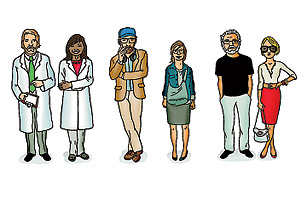
You have a demanding job, which means you also have expertise that schools can use to get students interested in subjects and career possibilities. Use your passion to spark theirs.
Citizen Schools engages a "second shift" of after-school volunteers from all walks of life — from park rangers to graphic designers, architects to dancers, doctors to travel agents — to lead students in grades 6 to 8 in 13-week apprenticeships culminating in a final project showcasing their work. In the past, citizen teachers have helped students make documentaries, build solar-powered cars, train assistance dogs, design furniture and stage mock trials, among many other things. Citizen Schools, which has been shown to improve student achievement, attendance and graduation rates, currently operates on 37 campuses in seven states.
National Lab Day was launched this spring to get professionals from the STEM fields (science, technology, engineering and math) into classrooms to encourage kids to consider careers in subject areas where U.S. students are falling behind. The initiative has launched a site where educators can post requests for the kinds of expertise they need to create hands-on experiences for their students. Volunteers might help students test their skin for bacteria, demonstrate how a human heart works, sample soil for a garden or build a robot. Non-STEM pros are needed too.
Communities in Schools is the nation's largest dropout-prevention organization and coordinates a range of services, from health care to tutoring, to keep kids in school and get them to college. In 2008-09, CIS was able to help 91% of the students it monitored reach the next grade. A wide range of volunteer opportunities are coordinated by nearly 200 local CIS programs in 25 states and D.C.
Mentoring young people in consistent, one-on-one relationships is a proven way to help them stay in school, improve academic achievement and avoid risky behavior. An estimated 3 million youths ages 10 to 18 are in formal mentoring relationships, but an estimated 14.6 million more need mentors to help keep them from dropping out, committing crimes or using drugs. You can begin a fulfilling mentoring relationship through organizations like Big Brothers Big Sisters, Mentor or U.S. Dream Academy, which focuses on children of the incarcerated.
Junior Achievement is a time-honored program, founded in 1919, that teaches K-12 students about entrepreneurship, workforce readiness and financial literacy with the help of business professionals, stay-at-home parents and others. Opportunities range from a single school day to a one-hour commitment for 10 weeks.